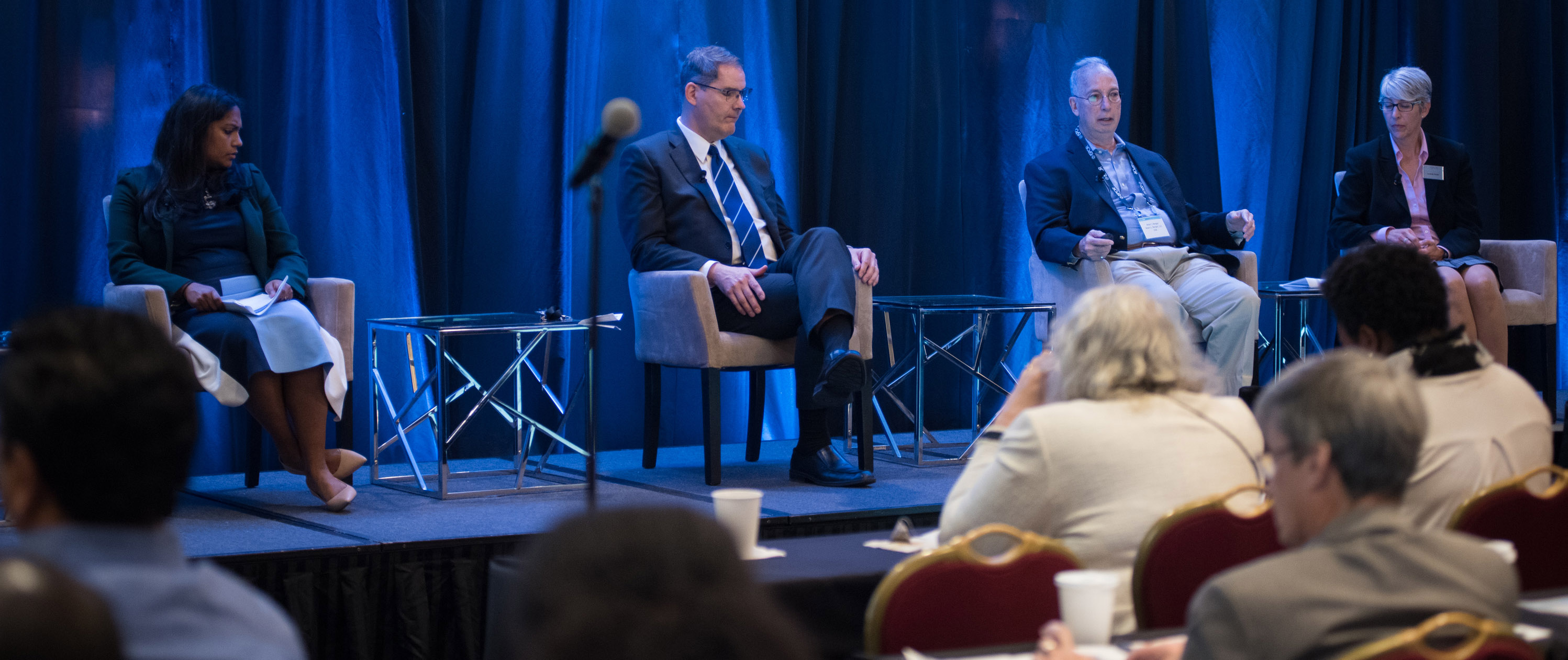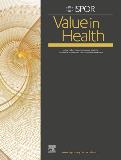
Real-world evidence on treatment outcomes can be an important aspect of the evidence basis for decision making if it is seen as credible. For real-world studies that are meant to test hypotheses about comparative-effectiveness or safety, a key aspect of credibility is that they are conducted transparently with tests that follow a prespecified analytic protocol. Preregistration of such study protocols on a public website would help build trust that their results can be used for decision-making purposes.
Establishing a Culture of Transparency for Real-World Evidence Studies...
The Real-World Evidence Transparency Initiative Partnership is a joint collaboration and ongoing effort between ISPOR, the International Society for Pharmacoepidemiology, the Duke-Margolis Center for Health Policy, and the National Pharmaceutical Council. The objective of this initiative is to establish a culture of transparency for study analysis and reporting of hypothesis evaluating real-world evidence studies on treatment effects.
Improving Transparency to Build Trust...
 The Real-World Evidence Transparency Initiative published a plan to encourage routine registration of noninterventional real-world evidence studies used to evaluate treatment effects. The report, “Improving Transparency to Build Trust in Real-World Secondary Data Studies for Hypothesis Testing—Why, What, and How: Recommendations and a Road Map from the Real-World Evidence Transparency Initiative,”
was published in the September 2020 issue of Value in Health.
The Real-World Evidence Transparency Initiative published a plan to encourage routine registration of noninterventional real-world evidence studies used to evaluate treatment effects. The report, “Improving Transparency to Build Trust in Real-World Secondary Data Studies for Hypothesis Testing—Why, What, and How: Recommendations and a Road Map from the Real-World Evidence Transparency Initiative,”
was published in the September 2020 issue of Value in Health.
More...
The report, “Improving Transparency to Build Trust in Real-World Secondary Data Studies for Hypothesis Testing—Why, What, and How: Recommendations and a Road Map from the Real-World Evidence Transparency Initiative,” was published in the September 2020 issue of Value in Health. The plan includes specifying the rationale for registering hypothesis-evaluating treatment effectiveness real-world evidence studies, the studies that should be registered, where and when these studies should be registered, how and when analytic deviations from protocols should be reported, how and when to publish results, and incentives to encourage registration.
Real-World Evidence Registry
The Real-World Evidence Registry provides researchers with a fit-for-purpose platform to register their study designs before they begin work to facilitate the transparency needed to elevate the trust in the study results.
More...
Real-world evidence studies can be used for hypothesis evaluation of treatment effects including safety (HETE studies). However these studies can also be perceived as less rigorous than clinical trials especially when not preregistered in a public setting such as ClinicalTrials.gov or the EU-PAS register.
ISPOR and its partners ISPE, NPC, and Duke Margolis have developed a simplified registration site especially for RWE HETE studies using secondary data. This searchable site provides a place for preregistration of studies that may not require registration for regulatory purposes but benefit from the rigor of transparent study methods and also provide a reference (such as a URL or doi) to share with peer reviewers, assessors, or other decision making bodies. Researchers can get started ‘here’ by creating a profile on the Open Sciences Framework and registering their study on the RWE Registry.
Shaking the Myth of Real-World Evidence
On-Demand Webinar
Learn more by watching the on-demand webinar, “Shaking the Myth of Real-World Evidence: Updates from the RWE Transparency Initiative.” This session provides updates from the initiative including a walk-through of the study registration site and updates on the special task force developing a standardized RWE protocol template.
Additional Resources
- Real-World Evidence Registry
 Good Practices Reports and Other ISPOR Reports from Value in Health
Good Practices Reports and Other ISPOR Reports from Value in Health
- HARmonized Protocol Template to Enhance Reproducibility of Hypothesis Evaluating Real-World Evidence Studies on Treatment Effects: A Good Practices Report of a Joint ISPE/ISPOR Task Force
- "Improving Transparency to Build Trust in Real-World Secondary Data Studies for Hypothesis Testing—Why, What, and How: Recommendations and a Road Map from the Real-World Evidence Transparency Initiative"
- "Good Practices for Real-World Data Studies of Treatment and/or Comparative Effectiveness"
- "Reporting to Improve Reproducibility and Facilitate Validity Assessment for Healthcare Database Studies V1.0"
- "Unlocking the Promise of Real-World Evidence" (Value & Outcomes Spotlight, Vol. 6, No. 5)
- ISPOR's Real-World Evidence Strategic Initiatives
Conferences & Summits

September 4, 2024
<h4>Advance your AI and machine learning proficiency — #3 on the list of ISPOR 2024-2025 Top 10 HEOR Trends Report!</h4><div><p>Explore large language models (LLMs) like GPT, BERT, and LLaMA, and how to use them for real world evidence generation and HEOR. </p><p>Topics include:</p><ul><li>Basics of large language models, </li><li>training models, </li><li>using the models for health data analysis, </li><li>optimal model selection for specific tasks, and </li><li>ethical considerations related to LLMs and health data.</li></ul><p>Participants will be introduced to prompt engineering using practical examples, allowing students to apply it to real LLMs, including: </p><ul><li>Examining medical data summarization using LLMs, </li><li>evidence generation, </li><li>analysis of healthcare data, and </li><li>the automation of value dossier creation.</li></ul><div><p><span style="background-color:transparent;color:inherit;font-family:inherit;font-size:inherit;text-align:inherit;text-transform:inherit;word-spacing:normal;caret-color:auto;white-space:inherit;">By completing this comprehensive course, participants will have the knowledge and skills to responsibly employ LLMs for practical tasks in RWE and HEOR while addressing regulatory requirements. </span></p></div></div><p><a class="button primary" href="https://portal.ispor.org/eweb/DynamicPage.aspx?webcode=EventInfo&Reg_evt_key=88484226-fdba-4531-b8e4-3d57a12a58ce&RegPath=EventRegFees&FreeEvent=0&Event=Q3%202024%20Virtual%20ISPOR%20Short%20Course:%20Practical%20Applications%20of%20Large%20Language%20Models%20for%20Real%20World%20Evidence%20Generation%20and%20HEOR&FundraisingEvent=0&evt_guest_limit=0" data-sf-ec-immutable="">Register Here</a><br /></p><div fontscheme-block="2" italic-block="true"><strong fontscheme="2" style="background-color:initial;font-size:inherit;text-align:inherit;text-transform:inherit;word-spacing:normal;caret-color:auto;white-space:inherit;"></strong><p><strong fontscheme="2" style="background-color:initial;font-size:inherit;text-align:inherit;text-transform:inherit;word-spacing:normal;caret-color:auto;white-space:inherit;"><em fontscheme="2" style="background-color:transparent;color:inherit;font-family:inherit;font-size:inherit;text-align:inherit;text-transform:inherit;word-spacing:normal;caret-color:auto;white-space:inherit;">To participate in hands-on activities, participants must have access to a laptop and a ChatGPT personal or corporate account.</em><br /><br />PREREQUISITE:</strong><span style="background-color:initial;font-family:inherit;font-size:inherit;text-align:inherit;text-transform:inherit;word-spacing:normal;caret-color:auto;white-space:inherit;"> General knowledge of ChatGPT is important.</span><br /></p></div><p><strong>LEVEL:</strong> Intermediate<br /><strong>TRACK:</strong> Real World Data & Information Systems<br /><strong>HEOR Key Competency:</strong> 5.3 Health Economic Modeling</p><div><p><strong style="background-color:transparent;color:inherit;font-size:inherit;text-align:inherit;text-transform:inherit;white-space:inherit;word-spacing:normal;caret-color:auto;">Faculty</strong><strong style="background-color:initial;font-size:inherit;text-align:inherit;text-transform:inherit;white-space:inherit;word-spacing:normal;caret-color:auto;"></strong></p><div><strong>Manuel Cossio, MMed, MEng</strong></div><div>Director of Business Development <span style="background-color:initial;font-family:inherit;font-size:inherit;text-align:inherit;text-transform:inherit;word-spacing:normal;caret-color:auto;white-space:inherit;"></span></div><div>Cytel Inc.</div><div>Zürich, Switzerland</div><div>AI Researcher</div><div>Universitat de Barcelona</div><div>Barcelona, Spain</div><div><br /></div><div><strong>Ben Bray, MD, MSc</strong></div><div>Evidence Generation Lead</div><div>Lane Clark and Peacock LLP</div><div>London, England, UK</div><div><br /></div><p><strong style="background-color:transparent;color:inherit;font-size:inherit;text-align:inherit;text-transform:inherit;word-spacing:normal;caret-color:auto;white-space:inherit;"></strong><strong style="background-color:transparent;color:inherit;font-size:inherit;text-align:inherit;text-transform:inherit;word-spacing:normal;caret-color:auto;white-space:inherit;">Schedule:</strong></p></div><p><strong>LENGTH:</strong> 4 Hours | Course runs 2 consecutive days, 2 hours each day</p><div><strong>Wednesday, 4 September 2024 | Course runs 2 consecutive days, 2 hours per day</strong></div><div>10:00AM–12:00PM Eastern Daylight Time (EDT)</div><div>14:00PM–16:00PM Coordinated Universal Time (UTC)</div><div>16:00PM–18:00PM Central European Summer Time (CEST)</div><div><br /></div><div><div><strong>Thursday, 5 September 2024 | Course runs 2 consecutive days, 2 hours per day</strong></div><div>10:00AM–12:00PM Eastern Daylight Time (EDT)</div><div>14:00PM–16:00PM Coordinated Universal Time (UTC)</div><div>16:00PM–18:00PM Central European Summer Time (CEST)</div><div></div><p><a href="https://www.timeanddate.com/worldclock/fixedtime.html?msg=September+4-5%3A+Virtual+ISPOR+Short+Course+%E2%80%9CPractical+Applications+of+Large+Language+Models+%E2%80%A6%E2%80%9D&iso=20240904T10&p1=12&ah=2" target="_blank" data-sf-ec-immutable="" style="font-family:inherit;font-size:inherit;text-align:inherit;text-transform:inherit;word-spacing:normal;white-space:inherit;" data-sf-marked="">Click for time zone conversion</a><br /></p></div><p><a class="button primary" href="https://portal.ispor.org/eweb/DynamicPage.aspx?webcode=EventInfo&Reg_evt_key=88484226-fdba-4531-b8e4-3d57a12a58ce&RegPath=EventRegFees&FreeEvent=0&Event=Q3%202024%20Virtual%20ISPOR%20Short%20Course:%20Practical%20Applications%20of%20Large%20Language%20Models%20for%20Real%20World%20Evidence%20Generation%20and%20HEOR&FundraisingEvent=0&evt_guest_limit=0" data-sf-ec-immutable="">Register Here</a><br /></p><div><p><a href="/education-training/short-courses">Back to all short courses</a><br /><br /><strong style="background-color:transparent;color:inherit;font-size:inherit;text-align:inherit;text-transform:inherit;word-spacing:normal;caret-color:auto;white-space:inherit;"><em>ISPOR short courses are designed to enhance knowledge and techniques in core health economics and outcomes research (HEOR) topics as well as emerging trends in the field. Short courses offer 4 or 8 hours of premium scientific education and an electronic course book. Active attendee participation combined with our expert faculty creates an immersive and impactful learning experience. Short courses are not recorded and are only available during the live course presentation.</em></strong><br /></p></div>)
Short Courses & Webinars

September 4, 2024
<h4>Advance your AI and machine learning proficiency — #3 on the list of ISPOR 2024-2025 Top 10 HEOR Trends Report!</h4><div><p>Explore large language models (LLMs) like GPT, BERT, and LLaMA, and how to use them for real world evidence generation and HEOR. </p><p>Topics include:</p><ul><li>Basics of large language models, </li><li>training models, </li><li>using the models for health data analysis, </li><li>optimal model selection for specific tasks, and </li><li>ethical considerations related to LLMs and health data.</li></ul><p>Participants will be introduced to prompt engineering using practical examples, allowing students to apply it to real LLMs, including: </p><ul><li>Examining medical data summarization using LLMs, </li><li>evidence generation, </li><li>analysis of healthcare data, and </li><li>the automation of value dossier creation.</li></ul><div><p><span style="background-color:transparent;color:inherit;font-family:inherit;font-size:inherit;text-align:inherit;text-transform:inherit;word-spacing:normal;caret-color:auto;white-space:inherit;">By completing this comprehensive course, participants will have the knowledge and skills to responsibly employ LLMs for practical tasks in RWE and HEOR while addressing regulatory requirements. </span></p></div></div><p><a class="button primary" href="https://portal.ispor.org/eweb/DynamicPage.aspx?webcode=EventInfo&Reg_evt_key=88484226-fdba-4531-b8e4-3d57a12a58ce&RegPath=EventRegFees&FreeEvent=0&Event=Q3%202024%20Virtual%20ISPOR%20Short%20Course:%20Practical%20Applications%20of%20Large%20Language%20Models%20for%20Real%20World%20Evidence%20Generation%20and%20HEOR&FundraisingEvent=0&evt_guest_limit=0" data-sf-ec-immutable="">Register Here</a><br /></p><div fontscheme-block="2" italic-block="true"><strong fontscheme="2" style="background-color:initial;font-size:inherit;text-align:inherit;text-transform:inherit;word-spacing:normal;caret-color:auto;white-space:inherit;"></strong><p><strong fontscheme="2" style="background-color:initial;font-size:inherit;text-align:inherit;text-transform:inherit;word-spacing:normal;caret-color:auto;white-space:inherit;"><em fontscheme="2" style="background-color:transparent;color:inherit;font-family:inherit;font-size:inherit;text-align:inherit;text-transform:inherit;word-spacing:normal;caret-color:auto;white-space:inherit;">To participate in hands-on activities, participants must have access to a laptop and a ChatGPT personal or corporate account.</em><br /><br />PREREQUISITE:</strong><span style="background-color:initial;font-family:inherit;font-size:inherit;text-align:inherit;text-transform:inherit;word-spacing:normal;caret-color:auto;white-space:inherit;"> General knowledge of ChatGPT is important.</span><br /></p></div><p><strong>LEVEL:</strong> Intermediate<br /><strong>TRACK:</strong> Real World Data & Information Systems<br /><strong>HEOR Key Competency:</strong> 5.3 Health Economic Modeling</p><div><p><strong style="background-color:transparent;color:inherit;font-size:inherit;text-align:inherit;text-transform:inherit;white-space:inherit;word-spacing:normal;caret-color:auto;">Faculty</strong><strong style="background-color:initial;font-size:inherit;text-align:inherit;text-transform:inherit;white-space:inherit;word-spacing:normal;caret-color:auto;"></strong></p><div><strong>Manuel Cossio, MMed, MEng</strong></div><div>Director of Business Development <span style="background-color:initial;font-family:inherit;font-size:inherit;text-align:inherit;text-transform:inherit;word-spacing:normal;caret-color:auto;white-space:inherit;"></span></div><div>Cytel Inc.</div><div>Zürich, Switzerland</div><div>AI Researcher</div><div>Universitat de Barcelona</div><div>Barcelona, Spain</div><div><br /></div><div><strong>Ben Bray, MD, MSc</strong></div><div>Evidence Generation Lead</div><div>Lane Clark and Peacock LLP</div><div>London, England, UK</div><div><br /></div><p><strong style="background-color:transparent;color:inherit;font-size:inherit;text-align:inherit;text-transform:inherit;word-spacing:normal;caret-color:auto;white-space:inherit;"></strong><strong style="background-color:transparent;color:inherit;font-size:inherit;text-align:inherit;text-transform:inherit;word-spacing:normal;caret-color:auto;white-space:inherit;">Schedule:</strong></p></div><p><strong>LENGTH:</strong> 4 Hours | Course runs 2 consecutive days, 2 hours each day</p><div><strong>Wednesday, 4 September 2024 | Course runs 2 consecutive days, 2 hours per day</strong></div><div>10:00AM–12:00PM Eastern Daylight Time (EDT)</div><div>14:00PM–16:00PM Coordinated Universal Time (UTC)</div><div>16:00PM–18:00PM Central European Summer Time (CEST)</div><div><br /></div><div><div><strong>Thursday, 5 September 2024 | Course runs 2 consecutive days, 2 hours per day</strong></div><div>10:00AM–12:00PM Eastern Daylight Time (EDT)</div><div>14:00PM–16:00PM Coordinated Universal Time (UTC)</div><div>16:00PM–18:00PM Central European Summer Time (CEST)</div><div></div><p><a href="https://www.timeanddate.com/worldclock/fixedtime.html?msg=September+4-5%3A+Virtual+ISPOR+Short+Course+%E2%80%9CPractical+Applications+of+Large+Language+Models+%E2%80%A6%E2%80%9D&iso=20240904T10&p1=12&ah=2" target="_blank" data-sf-ec-immutable="" style="font-family:inherit;font-size:inherit;text-align:inherit;text-transform:inherit;word-spacing:normal;white-space:inherit;" data-sf-marked="">Click for time zone conversion</a><br /></p></div><p><a class="button primary" href="https://portal.ispor.org/eweb/DynamicPage.aspx?webcode=EventInfo&Reg_evt_key=88484226-fdba-4531-b8e4-3d57a12a58ce&RegPath=EventRegFees&FreeEvent=0&Event=Q3%202024%20Virtual%20ISPOR%20Short%20Course:%20Practical%20Applications%20of%20Large%20Language%20Models%20for%20Real%20World%20Evidence%20Generation%20and%20HEOR&FundraisingEvent=0&evt_guest_limit=0" data-sf-ec-immutable="">Register Here</a><br /></p><div><p><a href="/education-training/short-courses">Back to all short courses</a><br /><br /><strong style="background-color:transparent;color:inherit;font-size:inherit;text-align:inherit;text-transform:inherit;word-spacing:normal;caret-color:auto;white-space:inherit;"><em>ISPOR short courses are designed to enhance knowledge and techniques in core health economics and outcomes research (HEOR) topics as well as emerging trends in the field. Short courses offer 4 or 8 hours of premium scientific education and an electronic course book. Active attendee participation combined with our expert faculty creates an immersive and impactful learning experience. Short courses are not recorded and are only available during the live course presentation.</em></strong><br /></p></div>)




